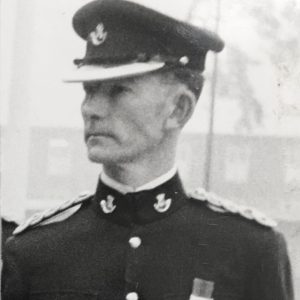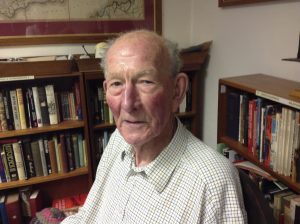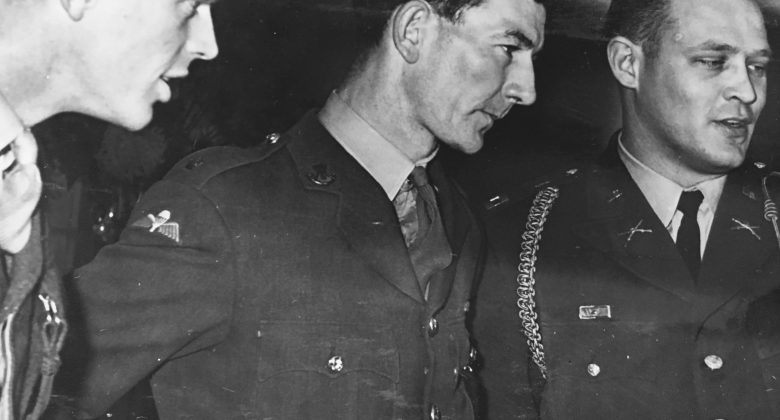Hugo White sits at his desk in the museum, clicking away at his typewriter, with his faithful companion Nessie at his feet. He’s often found handwriting personal letters, or on his hands and knees looking for a specific book in the library!
After an illustrious army career Hugo now spends his days looking up soldier’s records and researching family history for living relatives. A published author of a book all about the DCLI, Hugo was also instrumental in the inception of the museum 33 years ago.
Although he sits at his desk these days, he made a point during his army career to avoid the ‘desk’ at any cost and was steadfast in his need to be an ‘on the ground soldier’.
Born in the UK to a military family, Hugo spent a happy childhood in India. He wanted to join the army from a young age and hadn’t really considered doing anything else. So, in 1949, aged 18 1/2 he could wait no more, and joined up. “I never wanted to do anything else”. So off he went to Liverpool to enlist. He tells me he walked about 7 miles that day to find the enlistment place.
He remembers it well…
“It was an interesting day to say the least.. It was bitterly cold, and we had to strip to the skin. There we were, sat around in the bitter cold, utterly naked! Then it was all for nothing because the Doctor never turned up to do the examination and we had to put all our clothes back on! Eventually I was passed anyway”.
He was very much looking forward to starting his army life when he went off to The Coldstream Guards as a recruit at the Guards Depot in Keynsham. This was a tough 16 week recruit training and then a further 6 weeks doing the sport weaponry. “We had a very much harder and longer training period than the line regiments!”
“We did a lot of ceremonial work, because at any time you could be called upon to do Royal ceremonial duties”.
Having done his training with the Coldstream Guards, Hugo then went off to Sandhurst for an 18 month course which again put him through his paces! “We were up at 6am , then first parade at 7am , we went on until stand by your beds at 10pm at night. Very long exhausting days”.
We really did work very hard. There was a lot of military stuff, fitness, modern languages and mechanical science.”
Hugo then went on to train as an Officer at Sandhurst, which culminated in a lot of tests and a nerve-wracking wait to see if he had passed his Officer Training
“I was so worried at the end to see if I had passed or failed, I’d never been so nervous in my life!”
“The Junior term at Sandhurst was really very hard! Physically hard. A lot of drill. Standard of drill, particularly in those days was very high – and then after a long hard day, by 10pm you have to start turning out your kit again!”.

I wondered if he still keeps a very neat ‘ship’ after all that military training?
‘When in my best kit, a suit , I still like to turn myself out very well.
I am rather tidy although you may not think it from my desk! I hate untidiness and hate people who are not neat and disorganised, it’s drummed into you at Sandhurst!
In my day you did very little actual ‘soldiering’ . We rarely fired our rifles…which was a good thing because all the polish came off when the rifle got hot!
That was the thing about Sandhurst, you learn very little about what your job is going to be; as a Platoon Commander, with 30 young men under you. I could command brigade divisions, army corps, strategy and tactics of war.. But there was a big gap in actual man management of soldiers. This I still had to learn.
Once qualified you leave Sandhurst feeling fantastic.. You’ve got a star on your shoulder and you think you’ve made it!… Then you go off to join a battalion and it’s obvious very quickly that you’re rubbish and you’ve got to start learning on the ground and actually start looking after soldiers.
When you arrive as a new Platoon Commander the platoon look at you, and you can see them working out if they can turn you round their little finger or not. But as a newly joined 2nd Lieutenant you get an experienced Platoon Sergeant, who shows you the ropes. I had a man called Joe Paercy, who taught me more soldiering than any other man in my life!”
During this time Hugo, learnt all the skills to manage a platoon of soldiers;
“In soldiering, nothing ever goes to plan, even on exercises, from the first blank fire, you have to react very fast… things change, you need an alert mind, and have the ability to adapt quickly.”
Here he was with the Somerset Light Infantry, a young man at 20 years old, based in Munster, Germany. The only Southerner, surrounded by Geordies. His platoon were all hardy coal miners. “You become very close in the weapon pit; where you lived, slept, fought from… it was your home.”
Again, it was “Jolly hard work; training sessions started in spring. And you start at the very beginning with the National Service Soldiers. Explaining everything, all the basics, from scratch, such as; “This is a rifle, this is where the bullet comes out…”
“We started at the absolute basic level but they went on to ride army manoeuvres, company and brigade exercises. They were extremely competent soldiers by the end of the training with me”.
Hugo explains that the training sessions were extremely exhausting, with long periods without sleep.
“They were very tough – mainly because of exhaustion and lack of sleep. We often had no sleep for 2 or 3 days. We were moving all the time”.
He explains the typical brigade exercises ;“March 20 miles on foot, dig-in through the night, recce in morning, dig-in, moving back – I dug more holes in the ground than I thought I’d ever see again… and I’ve still got my shovel!
Hugo explains the fondness he had for his ‘Geordie soldiers’.
“They came to you from the pits, they had left school at 14, practically all coal miners, worked underground from 15 years. It made them tough – they never moaned about the very hard physical labour.
They learnt jolly quickly, were immensely loyal and they never slacked off.
They make superb soldiers! I think there was a great commitment of that generation because their fathers had done it in the war and it just wasn’t questioned.”
Next Hugo, at only 21 years old, went off to Malaya with his Platoon.
I ask ‘What sort of officer were you? Were you a tough officer? “I think I wasn’t bad actually, although I say it myself. I really enjoyed the camaraderie with my platoon soldiers. You get to know them very well; you basically become their father and mother.”
“After my platoon soldiers had been with me for their 18 months National Service, they would go back home to their friends and family and enjoy their life that little bit more.”
He had his 21st birthday on the way out to Malaya, and was stationed out there for 3 years but came back for duty at the Queen’s Coronation (more on that in a bit..)
Hugo explains that Malaya was quite different.
“It was much easier, partially because it was warm and you couldn’t work around the clock. Because in the Malayan Jungle, when it was dark… it was pitch black. You couldn’t do anything. It was the dead of night, and came about so quickly. Pitch black, so you had to stop.
We would have a sentry (look out), cook our evening meal before it rained which it did every night, then set up the perimeter wire around the camping area, put up our poncho capes for shelter, fill our water cans, then night-time, absolute silence , anyone outside the perimeter was shot.”
He tells me that at Christmas the army tradition was always that the officers would serve the Platoon ‘Gunfire’ tea. “It’s tea with a dash of rum in it!” Sounds fantastic!
Hugo returned to Britain for the Queen’s Coronation; he marched 12 -15 miles carrying the colours that day. He was billeted in Olympia, where there were about a thousand officers and men, “the place was full of beds!”
He remembers that “On the day of the coronation it was pouring with rain! We got up at 4am, had breakfast, got into our best uniform, with our capes on, we marched from Olympia to Birdcage Walk where we had our breakfast, then it was capes off and then soaked to the skin for rest of the day.”
“When we returned to Olympia, the Gunners had rigged up washing lines all around Olympia, and hung out all the regimental colours to dry. This was so special because it was probably the last time that all the county regiments existed, as shortly after that, they started the amalgamation. Now, not a single county regiment exists.”
I ask if he caught a glimpse of the new Queen that day? “Yes I did, the last time the Queen came out that day, it had stopped raining, the mall was still packed at midnight. We went early and were close to Buckingham Palace to see her on the balcony.”
He still remembers how beautiful she was in her formal dress, as she waved from the balcony at Buckingham Palace and the crowds along the Mall “sounded like rolling thunder! The cheering was so loud; it was fantastic and gave a great feeling of optimism.”
“Hilary had just reached the summit of Everest, and we were winning the war in Korea… the new Elizabethan era felt like a very optimistic time.”
The King had died whilst Hugo was stationed in Germany, he remembers getting the code word that he was dead, and that “the next morning they all wore black arm bands, had black crepe on colours and bugles; the military efficiency was incredible, it just happens! “
And as Prince Albert’s official regiment of The Somerset Light Infantry at this time, he went into court mourning for 6 months, wearing black arm bands and certainly no entertainment in the mess.
It was after the Coronation and another posting to Malaya, that Hugo returned back to the depot in Taunton to get married.
He had met his wife Caroline in Somerset, she was working as a solicitor’s clerk, but then almost immediately after getting married he took his Parachute Course, then went off to Cyprus, as a Brigade Intelligence Officer.
Then after 6 months in Jordan and a short time back to Cyprus, he then went back home to 3rd Battalion Parachute Regiment based in Aldershot, where during this time, his first child was born.
Hugo reflects on the Parachute Regiment as “the best battalion I’ve ever served with. Comradely and professionalism. My Field Marshall knew his stuff and didn’t suffer fools gladly. He was a delightful, friendly man”.
After 3 years in the Parachute Regiment he became Agent of the First Battalion in Gibraltar. This was a family station and he was in Gibraltar for 2 years, with his wife and 2 children. Here he would do 3 months tours in Africa for field training.
The next posting took him to Northern Ireland, in the Ulster Defence Regiment, where he served 3 years. It was a very dangerous job and he saw a lot of casualties.
It’s here that Hugo lost 12 colleagues to shootings and he too was threatened once. He lived in an old farm house and it was raided and a mine was let off by the entrance to his family home. Luckily the children were at boarding school in the UK, and everyone else was unharmed. He actually has a picture of his children dancing on the crater the mine left, a few months later.
He spent 3 years with the Ulster Defence Regiment, then he was posted out to Berlin, which he enjoyed. It was a dangerous station in as much as, they were the ‘trip wire to the Russians if they were to come across’. They did continual defence exercises, ceremonial patrolling in East Berlin too.
After Berlin, in 1964/65 he was off to join the Royal Navy for 2 years, as a Senior Officer. He once spent 79 days at sea without seeing land. He was 2 years, patrolling waters, protecting Rhodesian oil supplies.
It’s clear that the Army has provided Hugo with such a varied career; he’s travelled the world and taken on different roles at sea and on land. Hugo feels very strongly that the army is the best training for high command roles, “because soldiers move around and have all the different experiences. Soldiering is so varied, the Army gives a much broader education.”
I wonder if he has ever felt truly scared? “No, I don’t think so. When you are always with soldiers, and you’re supposed to be commanding them, you can’t show them you’re scared”
After 30 years of service Hugo decided to retire from the Army, I asked him why? “It’s a young man’s game, I didn’t want dreary jobs and it’s not that early retirement really, not army wise, and I wasn’t interested in clinging on; I didn’t fancy that.”
After the army he settled in Padstow with his family, in an old farm house they had bought years before. I ask what brought him to Cornwall. “Whilst on a posting I got a telegram from my wife once, asking if she could buy a run-down old house, I thought it was important to put down roots, and I knew we would need it after, so we bought it and are still living in it now”.
After a few stints as a National Trust volunteer, book distributor and blacksmith, Hugo returned to his military roots at Bodmin Keep where he was asked to move and update the museum by the Regimental Secretary at the time. And so, with a team of 8, he set about forming the main gallery spaces we still have in the museum today.


